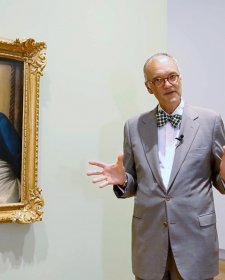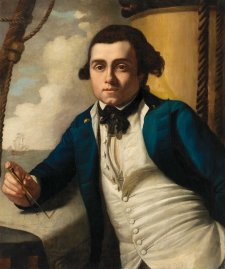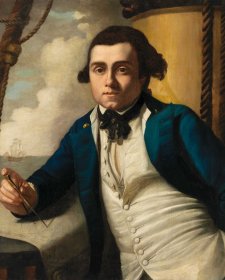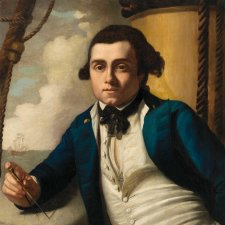- About us
- Support the Gallery
- Venue hire
- Publications
- Research library
- Organisation chart
- Employment
- Contact us
- Make a booking
- Onsite programs
- Online programs
- School visit information
- Learning resources
- Little Darlings
- Professional learning
William Bligh (1754–1817), naval officer and colonial governor, was born in Plymouth and first went to sea around the age of eight. Aged sixteen, he joined the Royal Navy, and six years later was appointed to Cook’s third voyage as Master of HMS Resolution. Bligh’s main task was to make charts, and on the voyage he honed the exceptional navigational skills that would become – along with volatility and authoritarianism – his best-known characteristics. Subsequently promoted to Lieutenant, he served in the West Indies before being appointed commander of HMS Bounty, which was to embark on a voyage to Tahiti to collect breadfruit plants for British settlements in the Caribbean. The Bounty left Portsmouth in December 1787 and arrived in Matavai Bay almost a year later. During the Bounty’s subsequent five-month stay, many crew members became happily accustomed to Tahitian ways and formed relationships with local women – attachments cited by Bligh as the most likely cause of the mutiny, led by second-in-command Fletcher Christian, that took place three weeks after they sailed from Tahiti in April 1789. According to Bligh’s account, he was dragged from his cabin at sunrise, bound and repeatedly threatened with death before being set adrift in the ship’s launch with eighteen supporters. The voyage that ensued is considered one of history’s most remarkable feats of seamanship, as Bligh, with minimal provisions and no maps, successfully navigated the open boat over 3000 miles to Timor, losing only one of his men and during the voyage charting part of the coast of Australia. Christian and the mutineers returned to Tahiti before sailing with eighteen companions to Pitcairn Island, where they burnt the Bounty at sea. Another fourteen mutineers were captured in Tahiti but some perished when the ship sent to apprehend them sank. Three of the ten mutineers eventually brought to trial in England were hanged. Honourably acquitted by the customary court martial that followed the loss of a ship, Bligh made a second, successful breadfruit- collecting voyage to Tahiti in the Providence between 1791 and 1793. In 1805, on the recommendation of Sir Joseph Banks, Bligh was appointed governor of New South Wales, taking up the post in August 1806 with a brief to curb the trade in rum and the influence of powerful, wealthy colonists. Again, despite his general integrity, Bligh’s abrasive manner and rigid adherence to orders created conflict over issues such as land, planning and convict labour. This led ultimately to Australia’s first and only military coup, the so-called ‘Rum Rebellion’ of January 1808, wherein Bligh was deposed by the New South Wales Corps and held under house arrest in Sydney for more than a year. After returning to England in 1810, Bligh was eventually promoted to Vice Admiral. He died in London, survived by his six daughters.
Purchased 2010



On one level The Companion talks about the most famous and frontline Australians, but on another it tells us about ourselves.



Twice rebelled against, and twice vindicated, William Bligh occupies an ambivalent space in Australian history. Angus Trumble, former Director of the National Portrait Gallery, explains.



30 March 2015
The life of William Bligh offers up a handful of the most remarkable episodes in the history of Britain’s eighteenth and early nineteenth-century maritime empire.